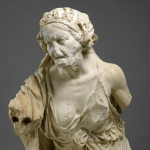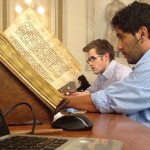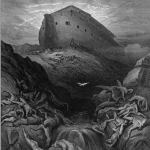Postscript
It dawns on me that I didn’t spend any time talking about why Biblical inerrancy may pose the greatest theological problem for Catholicism, as the title suggested. First off, admittedly, trying to the rank the severity of Catholic theological problems from “least threatening” to “most threatening” is hard, and obviously a little subjective.
I think that one of the biggest problems many people today have with Catholicism—particularly from a secular perspective—is the ethical failure(s) pertaining to child sex abuse and how this was and has been handled on an institutional level. After this, issues of the history of Church-sanctioned violence are another very commonly cited thing. Further, we might also point to people’s skepticism and incredulity over Catholicism’s fierce commitment to deontological ethics and natural law, and some of the practical consequences of this. (And to that we might also add charges of “institutional” sexism and homophobia.)
If this is a fair summation of some of the other most commonly cited problems, I think it’s interesting that most if not all of these fall into the territory of ethics and behavior.¹⁴
And to be sure, I don’t think these problems can be hand-waved away as easily as some people might wish they could, e.g. by merely appealing to the idea that no one has ever proclaimed any sort of impeccability for the Church or anyone in it, not even the Pope. Be that as it may though, I think that if people were better informed about, say, how Catholicism was not committed to any sort of notion of ecclesiastical or Papal impeccability, then at least a few prominent criticisms here would lose their luster. That’s why I consider them less potentially threatening to Catholicism’s viability than Biblical inerrancy.
As a kind of analogy for why Biblical inerrancy is so problematic, though: imagine that the Church did proclaim Papal impeccability; or perhaps even better, think of the all-too-common misconception of Papal infallibility in which the Pope is basically omniscient on matters of religion. If this were the case, and if the Church professed that its own legitimacy hinged on the truth of these things—that is, if it admitted that if the Pope were ever demonstrated to have sinned or been wrong on a religious issue, there’d be no reason to trust Catholicism about anything—then, well, it’d be a very easy matter to topple Catholicism.
If, in this thought experiment, Catholicism would be in an extremely precarious position, realize that this is precisely the position that the Bible itself is put in relation to Catholic dogmatic theology on inerrancy: if a single true historical or ethical error were demonstrated, then, on Catholic principles themselves, this inevitably puts Catholic belief on a slippery slope ultimately ending in disaster—for the Bible, for Catholicism, for Christianity itself.
As Pope Pius X wrote in his encyclical Pascendi dominici gregis (directly following a discussion of inerrancy, and after condemning the claim of the “Modernists” that “there are many [Biblical] passages referring to science or history where manifest errors are to be found,” etc.),
We, Venerable Brethren, for whom there is but one and only one truth, and who hold that the Sacred Books, “written under the inspiration of the Holy Spirit, have God for their author” declare that this [Modernist position against Biblical inerrancy] is equivalent to attributing to God Himself the lie of utility or officious lie, and we say with St. Augustine: “In an authority so high, admit but one officious lie, and there will not remain a single passage of those apparently difficult to practice or to believe, which on the same most pernicious rule may not be explained as a lie uttered by the author willfully and to serve a purpose.” (Epist. 28). Thus it will come about, the holy Doctor continues, that “everyone will believe and refuse to believe what he likes or dislikes.”¹⁵
⁂ ⁂ ⁂
Notes
[1] More on this especially in the second section.
[2] I realize this language of “intended” here is somewhat problematic, but I don’t think this is the place to get into it.
[3] §20-21. I’ve constructed somewhat of a hybrid translation here, the first part being from Brian Harrison (“Paul VI On The Truth And Inerrancy Of Sacred Scripture”), the latter the official Vatican version. The Latin texts read
At nefas omnino merit, aut inspirationem ad aliquas tantum Sacrae Scripturae partes coangustare, aut concedere sacrum ipsum errasse scriptorem. . . . tantum vero abest ut divinae inspirationi error ullus subesse possit, ut ea per se ipsa, non modo errorem excludat omnem, sed tam necessario excludat et respuat, quam necessarium est, Deum, summam veritatem, nullius omnino erroris auctorem esse. Haec est antiqua et constans fides Ecclesiae, solemni etiam sententia in Conciliis definita Florentine et Tridentino. . . . 21 Consequitur, ut qui in locis authenticis Librorum Sacrorum quidpiam falsi contineri posse existiment, ii profecto aut catholicam divinae inspirationis notionis pervertant, aut Deum ipsum erroris faciant auctorem.
[4] The full passage here—which relies on a scholastic distinction between how are inspired, though not disputing—reads
As the truths of Revelation laid down in Holy Writ are designed to serve the end of religious and moral teaching, inspiration per se extends only to the religious and moral truths. The profane facts of natural science and history contained in Holy Writ are not inspired per set but only per accidens, that is, by virtue of their relation to the religio-moral truths. The data inspired per accidens is also the Word of God, and consequently without error. (92)
(See also Pascendi dominici gregis §36.)
[5] On God as the ultimate “author” of Scripture, see in particular De Revelatione from Vatican I, Pascendi dominici gregis §36, and Providentissimus Deus §23.
[6] See my discussions of Biblical slavery linked to in my comment here.
[7] I’ve written about this further in my post here. Of course, as with before, we have somewhat the same issue here as to whether.
[8] It’s suggested in Providentissimus Deus §23 that “nothing can be proved either by physical science or archaeology which can really contradict the Scriptures” (nihil propterea ex rerum natura, nihil ex historiae monumentis colligi posse quod cum Scripturis revera pugnet). If this principle were taken to heart, couldn’t this leave the door open for a kind of denialism of various empirical disciplines? For similar observations, see the references in Note 10 below, especially the work of Gregory Dawes.
[9] See the older article of Chapman, “Papias on the Age of our Lord,” on early patristic confusion over this.
[10] A few different scholars who’ve expanded this at various length include Richard Blackwell, Richard H. Jones, and Gregory Dawes (especially in the latter’s recent Galileo and the Conflict Between Religion and Science). Particularly oriented toward Catholicism and historical criticism, see my comment here on John J. Collins.
[11] “Is a Critical Biblical Theology Possible?”
[12] One other neglected bit of Catholic dogmatic theology can be found in the canons of the First Vatican Council. Using the formal language of infallibility, at one point we find
Si quis dixerit, disciplinas humanas ea cum libertate tractandas esse, ut earum assertiones, etsi doctrinae revelatae adversentur, tanquam verae retineri, neque ab Ecclesia proscribi possint; anathema sit.
If anyone shall say that secular academic disciplines are to be so freely treated, that their assertions, although opposed to revealed doctrine, are to be held as true, and cannot be condemned by the Church; let him be anathema.
Of course, the Church obviously has no authority to enforce this view outside of its own institutions, or in a society in which it has broader civil authority. This could be tied in with other Catholic dogmatic theology on religious liberty—which has undergone some major development in the past century or so.
[13] I’m thinking particularly of Leviticus 25:45-46 again here.
[14] To be sure, there are also a host of assorted other criticisms pertaining to various historical ideas—though there are a lot of misconceptions here; and there are other near- or fully- conspiratorial ideas. (On these cf. Philip Jenkins’ The New Anti-Catholicism: The Last Acceptable Prejudice.)
Finally, many people see things like the theological foundations of Papal infallibility or the metaphysics of transubstantiation as woefully arcane or perhaps ever prima facie absurd. (Although I think there are serious and indeed fatal problems with both of these notions, I’m not throwing out this polemical “absurd” as my own characterization, but rather that of others—and, again, particularly secular criticisms.)
[15] The Latin texts of this reads
Nos equidem, Venerabiles Fratres, quibus una atque unica est veritas, quique sacros libros sic aestimamus quod Spiritu Sancto inspirante conscripti Deum habent auctorem, hoc idem esse affirmamus ac mendacium utilitatis seu officiosum ipsi Deo tribuere; verbisque Augustini asserimus: Admisso semel in tantum auctoritatis fastigium officioso aliquo mendacio nulla illorum librorum particula remanebit, quae non ut cuique videbitur vel ad mores difficilis vel ad fidem incredibilis, eadem perniciosissima regula ad mentientis auctoris consilium officiumque referatur (Epist. 28). Unde nec quod idem sanctus Doctor adiungit: In eis, scilicet Scripturis, quod vult quisque credet, quod non vult non credet.














